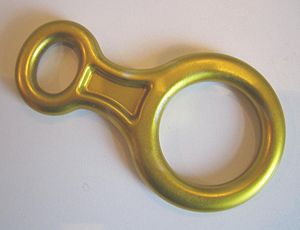Difference between revisions of "AY Honors/Rock Climbing/Figure Eights"
m (4 revisions: re-import from WB, including edit history) |
|||
| Line 2: | Line 2: | ||
Sometimes just called "eight", this device is most commonly used as a descender, but may also be used as a belay device in the absence of more appropriate equipment. | Sometimes just called "eight", this device is most commonly used as a descender, but may also be used as a belay device in the absence of more appropriate equipment. | ||
| − | It is an aluminium (or occasionally steel) "8" shaped device, but comes in several varieties. | + | It is an aluminium (or occasionally steel) "8" shaped device, but comes in several varieties. Its main advantage is efficient heat dissipation. A square eight, used in rescue applications, is better for rappelling than the traditional 8. Because of the "ears" or "wings" on the rescue 8, there is less chance of forming a girth hitch while rappelling very quickly. |
[[Image:Belaying8.jpg|thumb|right|A figure eight descender]] | [[Image:Belaying8.jpg|thumb|right|A figure eight descender]] | ||
| − | Figure eights allow fast but controlled descent on a rope. They are easy to set up and are effective in dissipating the heat caused by friction but have a tendency to put a twist in the rope. | + | Figure eights allow fast but controlled descent on a rope. They are easy to set up and are effective in dissipating the heat caused by friction but have a tendency to put a twist in the rope. This twisting only occurs during improper use of the 8. Holding the brake hand off to the side twists the rope, whereas holding the brake hand straight down, parallel to the body, allows a controlled descent without twisting the rope. Because of the many bends it puts into the rope, an 8 descender can wear a rope quicker than a tube style belay/rappel device. Many sport climbers also avoid them because of the extra bulk an 8 puts on the rack. However, many ice climbers prefer to use the 8, because it is much easier to thread with stiff or frozen rope. |
==== Rescue eight ==== | ==== Rescue eight ==== | ||
Revision as of 15:43, 8 September 2021
Figure eight
Sometimes just called "eight", this device is most commonly used as a descender, but may also be used as a belay device in the absence of more appropriate equipment.
It is an aluminium (or occasionally steel) "8" shaped device, but comes in several varieties. Its main advantage is efficient heat dissipation. A square eight, used in rescue applications, is better for rappelling than the traditional 8. Because of the "ears" or "wings" on the rescue 8, there is less chance of forming a girth hitch while rappelling very quickly.
Figure eights allow fast but controlled descent on a rope. They are easy to set up and are effective in dissipating the heat caused by friction but have a tendency to put a twist in the rope. This twisting only occurs during improper use of the 8. Holding the brake hand off to the side twists the rope, whereas holding the brake hand straight down, parallel to the body, allows a controlled descent without twisting the rope. Because of the many bends it puts into the rope, an 8 descender can wear a rope quicker than a tube style belay/rappel device. Many sport climbers also avoid them because of the extra bulk an 8 puts on the rack. However, many ice climbers prefer to use the 8, because it is much easier to thread with stiff or frozen rope.
Rescue eight
A rescue eight is a variation of a figure eight, with "ears" or "wings" which prevent the rope from "locking up" or creating a girth hitch, thus stranding the rappeller on the rope. Rescue eights are frequently made of steel, rather than aluminum.

